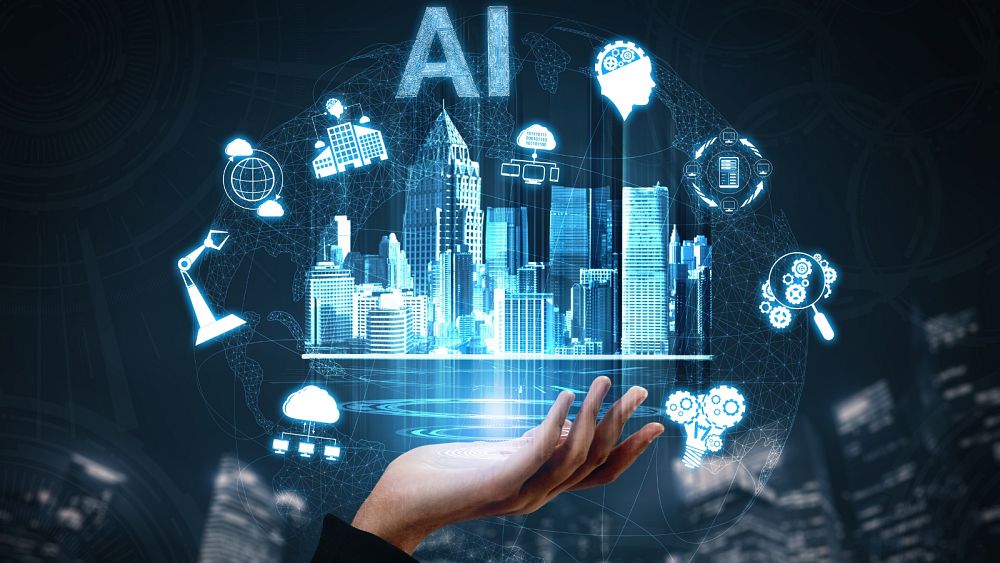[ad_1]

Hospitality giant Accenture announced a €2.7 billion investment in artificial intelligence, doubling its talent pool from 40,000 to 80,000.
Accenture will invest $3 billion (€2.7 billion) in artificial intelligence (AI) over the next three years to help its clients “harness AI’s full potential to reshape their strategy, technology, and ways of working”.
The investment, expected to have an impact across 19 industries, will double Accenture’s AI talent pool through hiring, acquisitions, and training, the company told Euronews Next at Cannes Lions.
The multi-billion venture will also launch a new “AI Navigator for Enterprise,” described as a “generative AI-based platform” that will help the company’s clients “define business cases, make decisions, navigate AI journeys, choose architectures and understand algorithms and models to drive value responsibly”.
Accenture has been researching and building on AI for over a decade, and the company’s expertise spans more than 1,450 patents worldwide.
The company is already using the technology to, for example, help hotel groups manage customer queries or synthesise judicial process information across hundreds of thousands of complex documents.
Six years ago, the professional services company pioneered its responsible AI framework, a code of ethics that underlies its rigorous responsible AI compliance programme.
AI as a ‘co-pilot’
“Obviously, AI will profoundly change how we work, what we make, and everything in between,” David Droga, CEO of Accenture Song, told Euronews Next.
However, “the democratisation of a technology that offers more shortcuts, access and unlimited options could also mean mediocrity in higher volume and at pace.
“This means in our collective pursuit of efficiency and the new, we all have a responsibility to not outsource empathy, craft or humanity”.
Jatinder Singh, global intelligence lead at Accenture Song – the world’s largest digital agency – says the company “as you would fully expect, has a lot of lawyers” to ensure a swift and responsible transition.
But on an “equally important” level, they have recognised the need to include “philosophers and historians that are looking at bias,” analysing questions such as “how is this technology going to be used? How are we ensuring that the algorithms that we are developing are fair?”
“We need to ensure also from a data science perspective that we’re looking at the data that’s going in to ensure that those algorithms are equitable,” Singh said.
Accenture thinks AI will become human’s co-pilot, says Singh, “replacement of some jobs, yes, but sort of like co-pilot thing”.
With regards to creativity, AI would be expected to, for example, reduce some of “the blocking and tackling” to find insights.
Not only that, it would “free up the strategist time, the ethnographers time or the cultural anthropologist time so that they can really take a stand and say, what am I going to do with this insight – letting AI do some of the heavy lifting – which is why we call it a copilot versus a replacement,” said Singh, adding that many new careers will also emerge.
“I think the easy place people go to is I need a lot of STEM talent – science, technology, engineering, and mathematics talent – to build out these technologies and algorithms,” he noted.
Accenture will use AI to diagnose problems, as well as to inform how to solve them, explains Singh, “that’s the North Star that we are actually working towards,” and then ultimately understanding what will the technology enable to create.
Collaborating with generative AI
During this year’s Cannes Lions Festival, Euronews Next had an exclusive preview of Accenture Song’s demos, showcasing how AI will collaborate alongside humans in the creative process.
Among the groundbreaking products showcased was an “ever-evolving picture book,” a unique digital children’s book where generative AI continuously reimagines the illustrations each time it is read, offering the option to choose different art movements such as magical realism and pointillism.
Another example included ‘Eureka,’ an arcade game that generates marketing campaign ideas using a powerful generative AI algorithm trained on previous award-winning campaigns.
Meanwhile, a ‘sustainable design assistant’ gave a demonstration of a tool enabling designers to make sustainable decisions at the earliest stages of the design process.
This year in March, tech leaders including Elon Musk and Steve Wozniak signed an open letter calling for a pause on AI development over its potential risks.
The letter, published on the website for The Future of Life Institute, claimed AI labs were “locked in an out-of-control race to develop and deploy ever more powerful digital minds that no one – not even their creators – can understand, predict, or reliably control”.
Singh says he “understands” the call for the pause, but at Accenture, they are “also understanding how to pragmatically use this and scale it in a responsible way”.
The “dystopia utopia conversation” is something that has been around since “the genesis of technology,” he says, and AI concerns are just “the next iteration of that”.
Watch the video in the media player above for more from this interview at the 2023 Cannes Lions Festival of Creativity.
[ad_2]
Source link
